
As we reflect on 2022, we are proud to look back on a year of many successes and achievements in our campaigns, against the backdrop of a challenging political environment. With the support of Humanists UK members and supporters, we have worked strenuously to advance our vision of a world where rational thinking and kindness prevail, and where the values of freedom of thought, choice, and expression are paramount.
Throughout the year, we have focused our efforts on a range of key campaigns in line with our 2025 strategy, as well as a large volume of reactive work to uphold the rights of the non-religious, or where we stood to bring a distinctively humanist perspective to current affairs. All this work has only been possible due to Humanists UK members, donors, and supporters.
One measure of success is that 2022 has been the busiest year for media coverage in our 126-year history, as media outlets turned to Humanists UK for a trusted source of commentary on ethical and constitutional issues, humanism in society, humanist ceremonies, and issues affecting the non-religious.
1) Humanists UK’s Census campaign
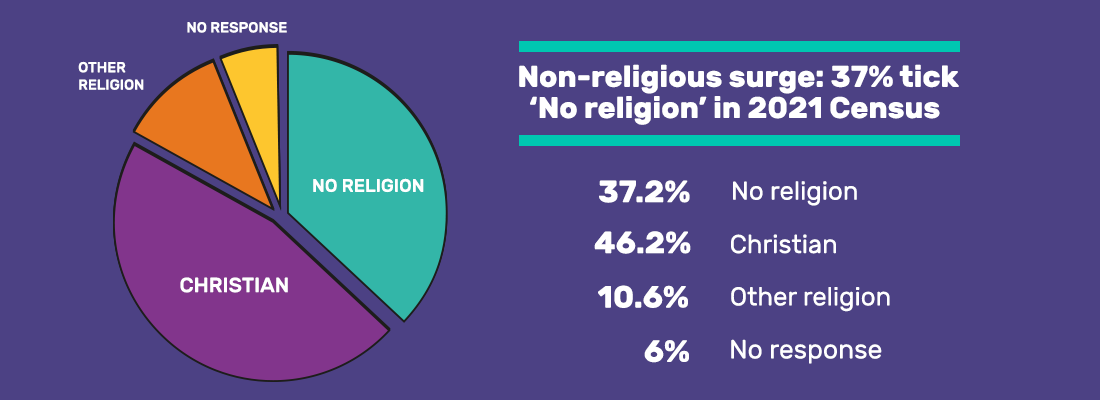
In the Census results released late in 2022, 37% of England and Wales ticked ‘No religion’, and for the first time in Census history, more people ticked ‘No religion’ than ‘Christian’ in Wales. There was an increase of eight million people ticking ‘No religion’ in England and Wales, compared to the 2011 Census. These results, we argued, emphasise the need to reassess the relationship between religion and the state. It’s clear that such anachronisms as collective worship laws, bishops in the House of Lords, and discriminatory faith schools no longer represent the nation with its increasing diversity. The fact remains: no state in Europe has such a religious set-up in terms of law and public policy as we do, while at the same time having such a non-religious population.
It is worth remembering that these Census results, while seismic, still provide a dramatic under-count of the non-religious in Britain. Nevertheless, they offer a clear wake-up call for constitutional and social reform to reflect a much-changed, more pluralistic society in which those Christian beliefs given a place of privilege in our laws are shared by only a minority of Britons.
2) Mounting pressure on the UK Government to keep its promises on illegal schools

After more than eight years of our campaigning, the UK Government took significant action against illegal faith schools in the Schools Bill. The legislation was set to grant Ofsted the powers it needs to take action, and to close loopholes in the law that enabled illegal schools to operate. However, due to other controversial aspects of the Schools Bill around academisation, the UK Government has abandoned the entire Bill and, with it, plans to protect children from illegal faith schools.
It is estimated that there are at least 6,000 pupils stuck in illegal schools throughout England. Many are religious institutions which force children into unsanitary conditions, with no regard for safeguarding. Often the schools pose as centres for ‘part-time’ tuition, when, in reality, they force pupils to study religious texts for up to 12 hours a day. A history of sexual abuse and corporal punishment is also well documented. We are hoping the Government will introduce new legislation in the new year, and continue to fight for the rights of children stuck in such appalling conditions.
3) Northern Ireland Government backs humanist marriages by promising to codify them in statute
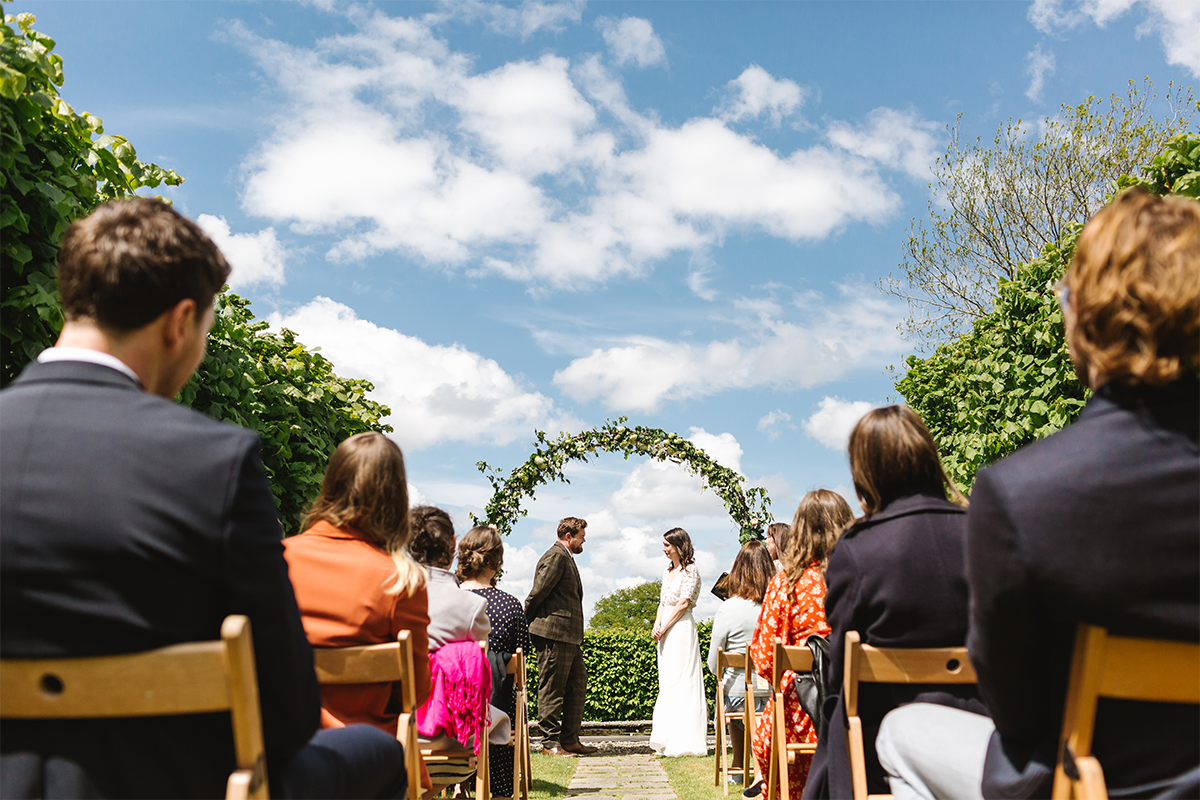
Northern Ireland Finance Minister Conor Murphy announced in July the Government’s intention to write humanist marriages explicitly into Northern Irish law. The decision followed a public consultation that we responded to. Humanist marriages have been legally recognised in Northern Ireland under case law since 2017, following a campaign led by Northern Ireland Humanists. Although this form of recognition is permanent, writing them directly into marriage law makes the law easier for everyone to understand, as it makes explicit in the legislation what is required by the legal precedent.
4) Northern Ireland High Court: Exclusively Christian RE and worship ‘unlawful’
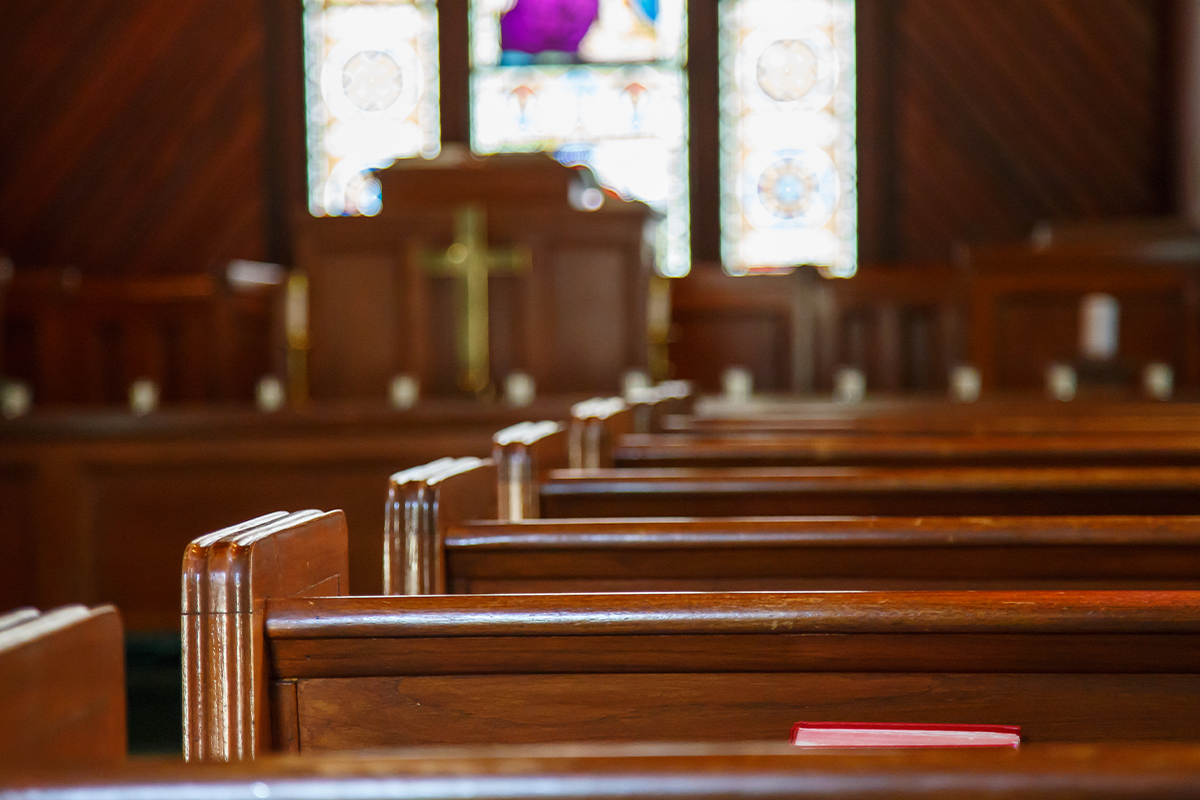
In July, the Northern Ireland High Court ruled that the law requiring exclusively Christian religious education and collective worship in all schools is unlawful on grounds of freedom of religion or belief. We welcomed the decision, and called for the repeal of the collective worship law in England and Wales.
5) Two landmark education Acts and one new Coalition in Northern Ireland

In April, we welcomed the passing of Integrated Education and Anti-Teacher Discrimination Acts in Northern Ireland. The first Act will allow for the establishment of more integrated schools, where children of different religious and cultural backgrounds can learn together. The second will protect teachers from discrimination on the basis of their religion or belief.
The Inclusive Education Coalition was co-founded by Northern Ireland Humanists. The Coalition believes all children have the right to an education that is free from discrimination and open families from all backgrounds and beliefs. It also advocates for the rights of children and parents, and works to raise awareness about the importance of inclusive education.
6) Humanism now taught in all state schools in Wales
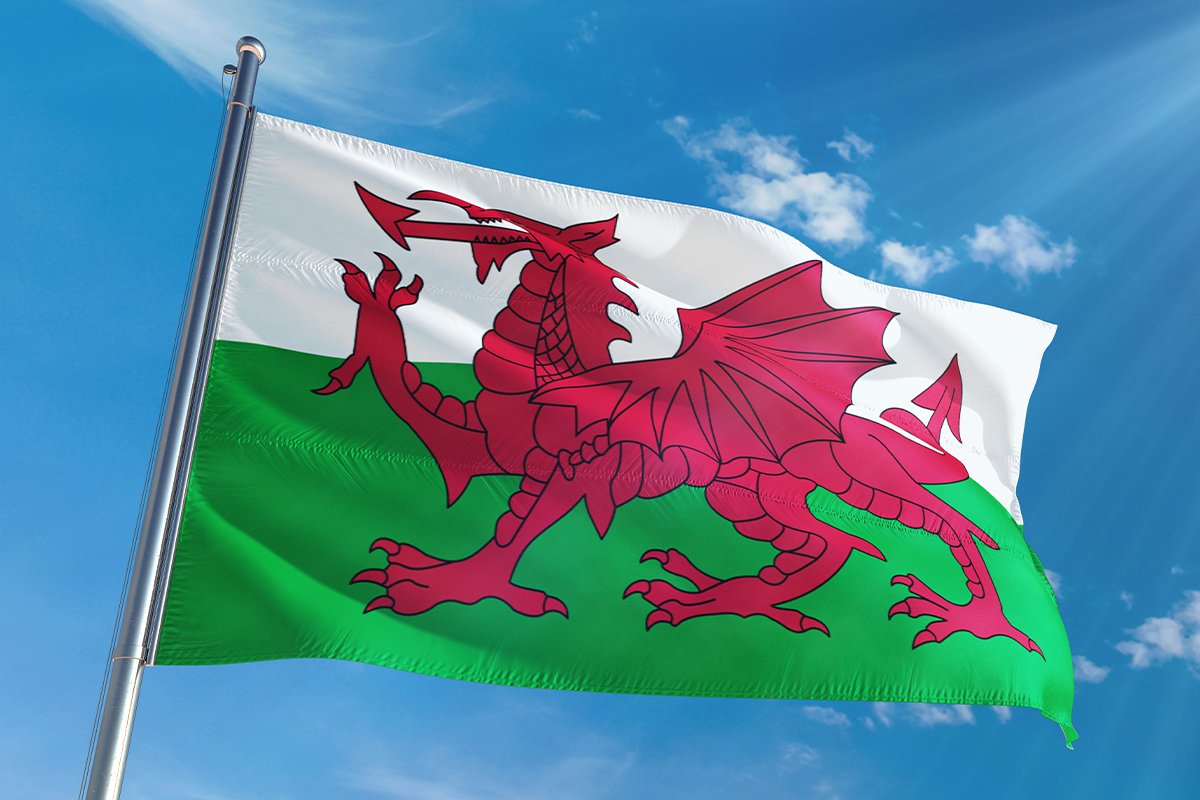
We celebrated a landmark moment in the campaign for inclusive education in September, as state-funded schools across Wales replaced Religious Education (RE) with Religion, Values, and Ethics (RVE). The new curriculum is part of a nationwide initiative for a broader, more balanced, and pluralistic approach to education. As part of this, humanism is now on an equal footing to religions in classrooms.
The move comes under the Curriculum and Assessment (Wales) Act and follows five years of our campaigning. In 2017 our Wales Coordinator Kathy Riddick was denied membership of her local Standing Advisory Council on RE (SACRE), on the basis that humanism is not a religion. These bodies oversee the RE syllabus in each local authority. In response, we launched a legal challenge against the local authority and won the right to take a judicial review under the Human Rights Act. The Council then backed down. Then, in 2018, the Welsh Government decided it agreed with us – humanists can be on SACREs.
This, in turn, set off a sequence of events leading to a whole new law that sees the explicit admittance of humanists to the new RVE bodies, and the inclusion of humanism in the new curriculum rolled out from September. We campaigned in support of the landmark legislation throughout its passage through the Senedd, in parallel with similar progressive reforms of Relationships and Sexuality Education. As highlighted previously in our report to mark 100 years of secularism in Welsh political life, these reforms together make Wales a ‘world leader in inclusive education’.
7) Humanist marriage support at an all-time high with publication of Law Commission report

We are calling on the UK Government to give immediate legal recognition to humanist marriages in England and Wales, following the publication of the Law Commission’s long-awaited report on marriage reform in July. Since 2018, the UK Government has used this pending publication as the reason for delaying legal recognition on the premise that reform should be ‘wholesale’, not ‘piecemeal’. The report recommends an extensive and very-long-term overhaul of marriage law, and considers humanist marriage as part of this. We want to see ongoing discrimination against humanists ended much sooner than such a timetable would allow, ahead of any wider reforms.
The UK Government has had the power to immediately grant legal recognition since 2013 under the Marriage (Same-Sex Couples) Act. It must now address this inequality with swift effect. To put it simply: there is no longer any justification for delay. Fundamental marriage reform, if it even happens, may take many years. There is cross-party support on this issue. We organised a joint letter from over 50 politicians, and assisted the All-Party Parliamentary Humanist Group (APPHG) with organising three debates on the issue in Parliament in 2022.
8) Humanists promote freedom for all at Freedom of Religion or Belief Ministerial
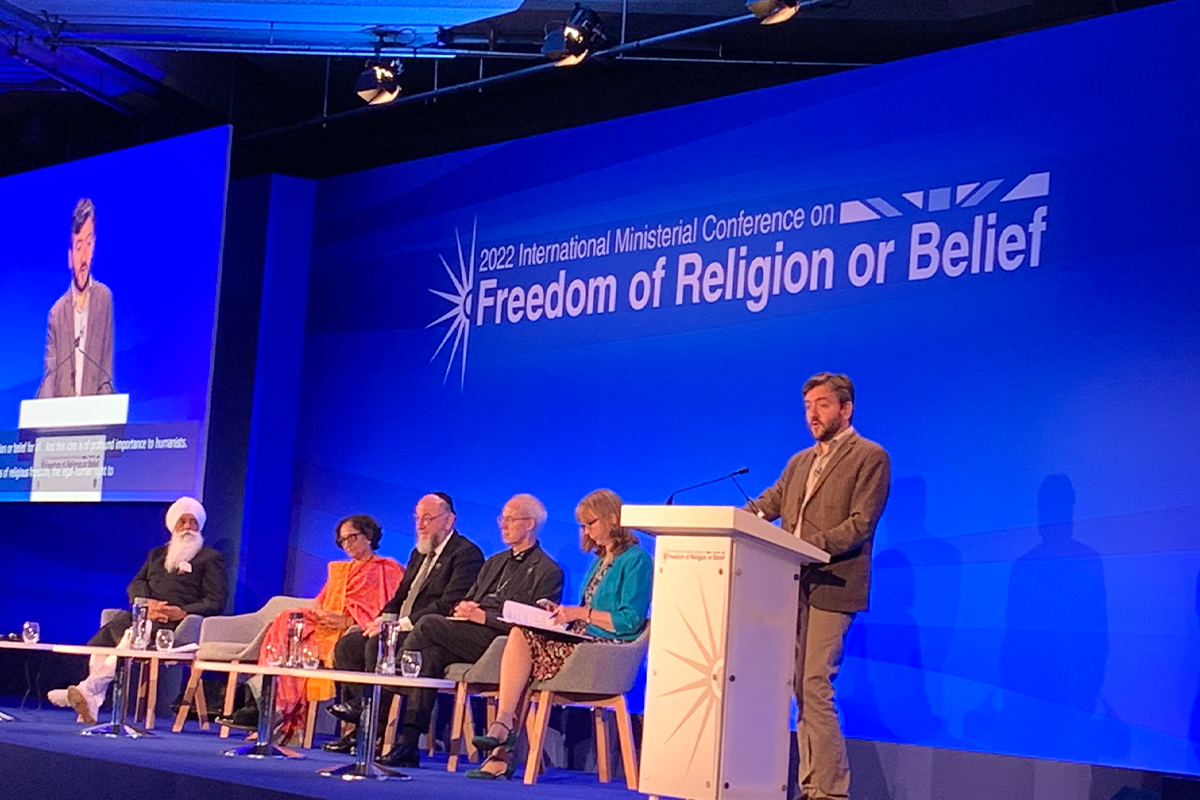
Our Chief Executive Andrew Copson joined Prince Charles (now King Charles III), the then-Foreign Secretary Liz Truss, the Archbishop of Canterbury, the Chief Rabbi, and other prominent figures in opening the UK Government’s International Ministerial on Freedom of Religion or Belief in London, held from 5-6 July. As sole representatives of the non-religious, we held seven events and took part in eight more, bringing to the attention of delegates the persecution humanists face around the world.
Over 70% of the world’s population live in countries that severely discriminate against the non-religious. 13 maintain the death penalty for ‘blasphemy’ or apostasy. We conveyed that, for millions of humanists, freedom of religion or belief is not possible, and no matter our background, we are all minorities somewhere. This, we said, is why we must all stand together – because when only one way of life is accepted, all minorities suffer.
9) We successfully pressure Government to maintain support for global abortion rights
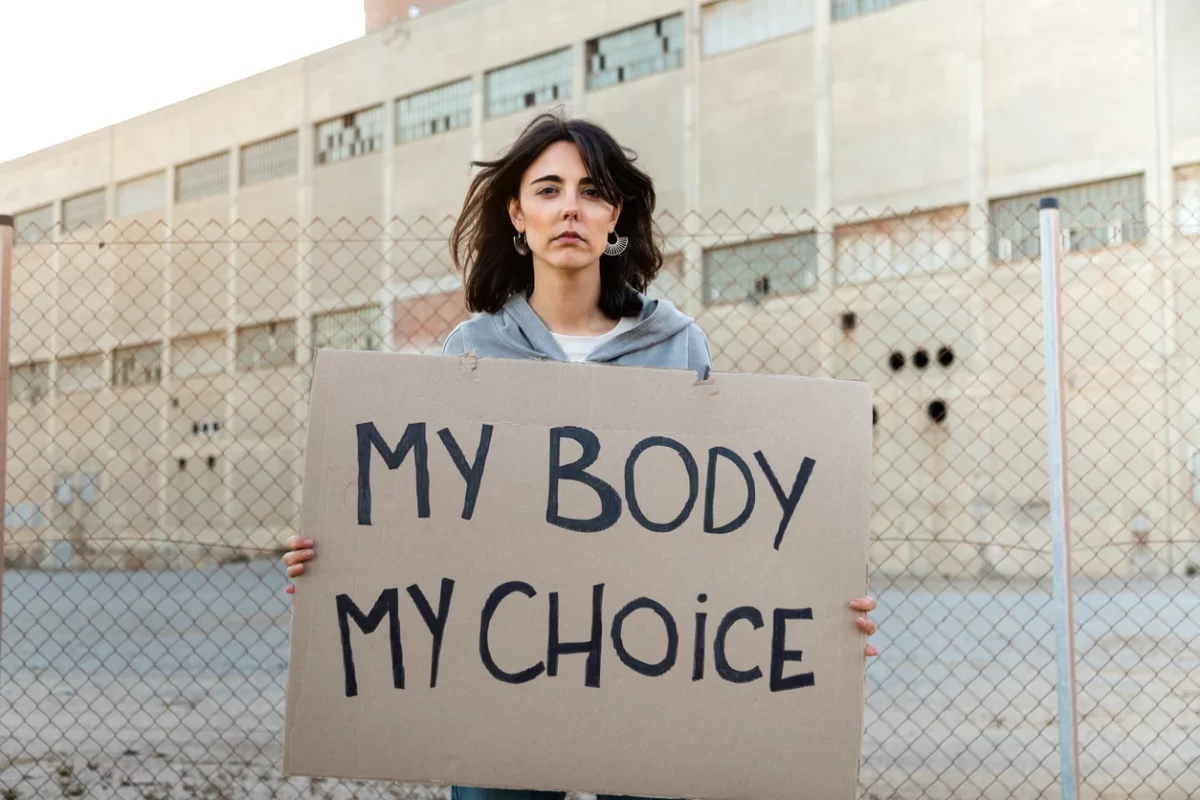
The UK Government deleted abortion rights from a multinational human rights statement on gender equality, we revealed in July. The original statement, issued at the aforementioned Ministerial, commits to abolishing laws that restrict women’s human rights. It was signed by 28 countries and included clear reference to ‘sexual reproductive health and rights’ and ‘bodily autonomy’. But days after the Ministerial, the UK unilaterally deleted these terms. We broke the story in the national press, and our call for a reversal of the deletions was backed by 20 human rights organisations and the governments of Norway, Denmark, and the Netherlands.
The changes almost certainly reflected internal conflicts within Government about how to properly balance women’s fundamental human rights with religious attitudes to abortion. It was a sorry example of the Government getting this balance wrong. But following our efforts, the UK Government has since quietly used the opportunity of a subsequent conference on preventing sexual violence in conflict to issue a new multinational statement on reproductive rights, upholding them as fundamental after all.
10) Humanists ramp up campaign to free Nigeria’s Mubarak Bala
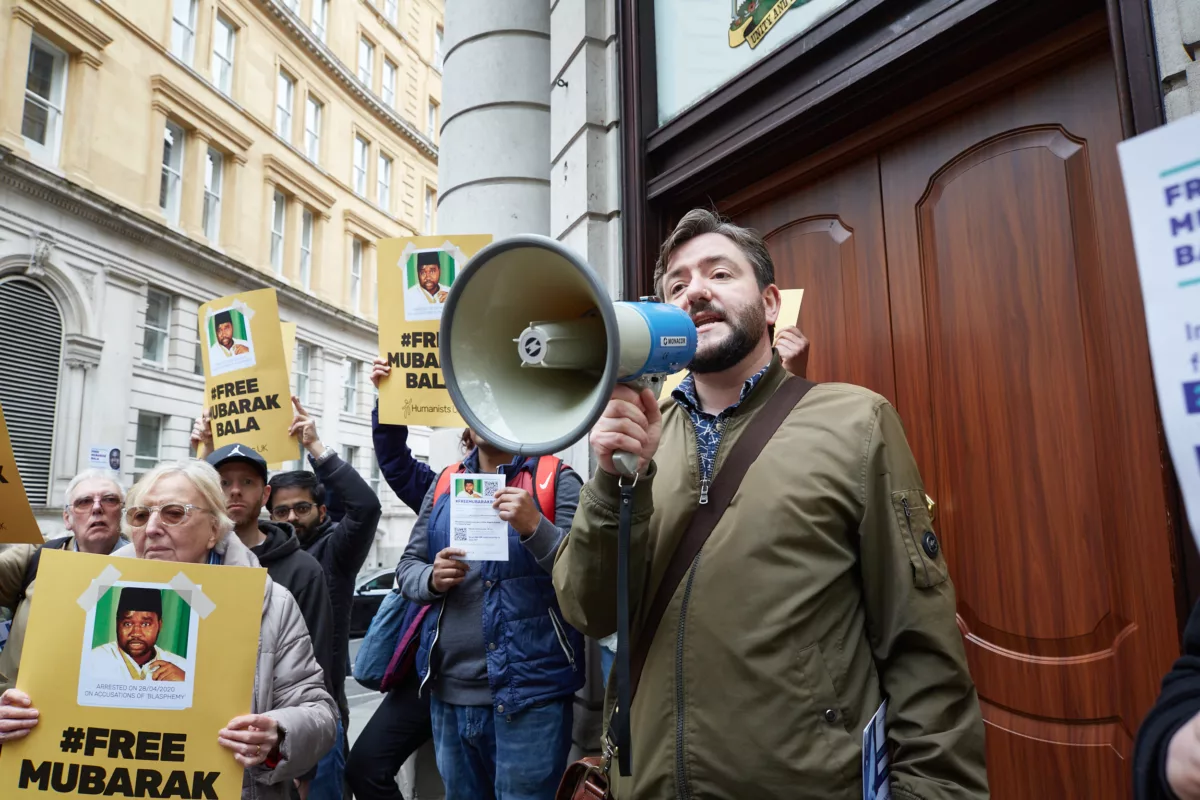
Our colleague, the Nigerian humanist Mubrak Bala, was sentenced to 24 years in prison this year for ‘blasphemy’. Bala, who is the President of the Humanist Association of Nigeria, has long been an advocate for the rights of non-religious people. We condemned his arrest and called for his release, and organised protests outside the Nigerian High Commission in April following his sentencing. We also met with the Nigerian High Commissioner about the case, urging him to respect Bala’s rights and to release him from detention. We have also had his case raised repeatedly in the UK Parliament – 40 times so far, 20 of which were this year.
11) Landmark progress on assisted dying
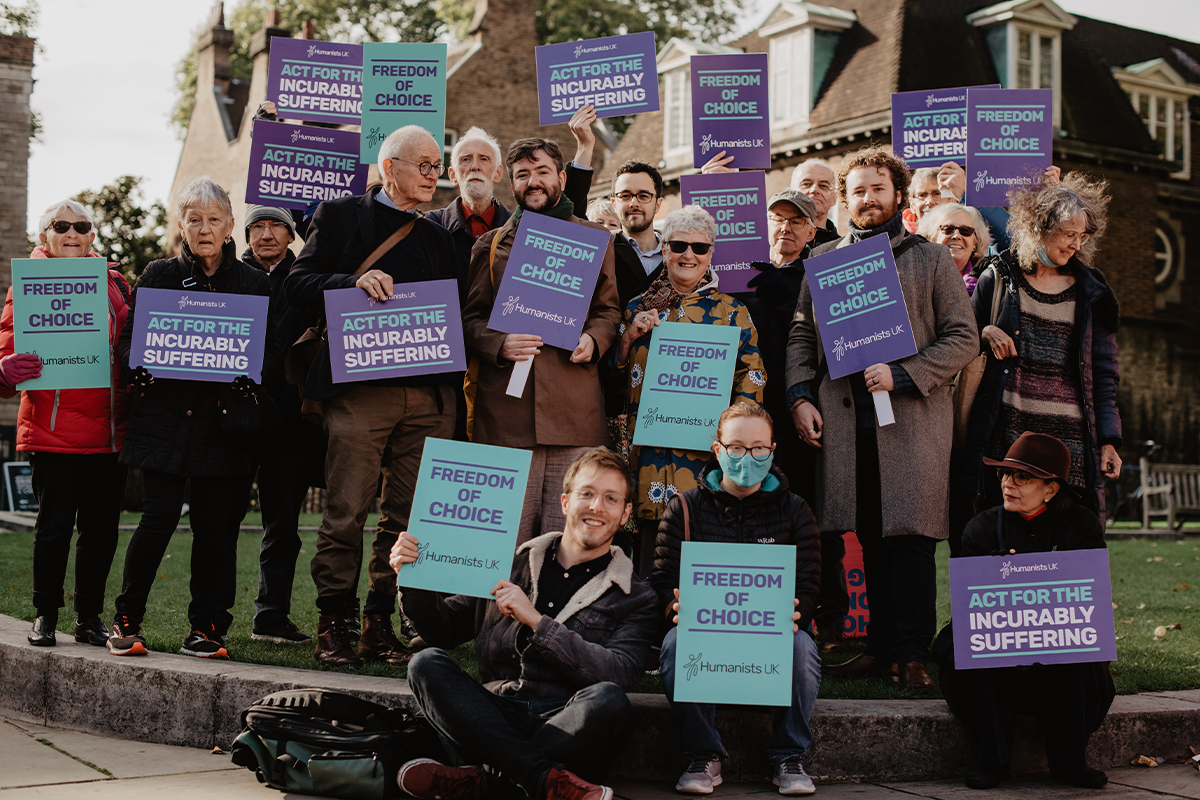
For the first time in 17 years, the UK Parliament has launched an assisted dying inquiry in England and Wales. The announcement of the inquiry comes as a milestone for the right-to-die campaign. Its launch means England and Wales now join Scotland, the Isle of Man, and Jersey (where we provided oral evidence to the citizens’ jury), Portugal, Ireland, France, and Italy, as countries currently debating or legislating on assisted dying.
The inhumane ban on assisted dying in the UK leads to situations in which individuals are forced to endure prolonged suffering or take desperate measures to end their lives. We argue that a compassionate assisted dying law would provide individuals with the option of a peaceful and dignified death, and would alleviate suffering for those who are facing terminal illness or incurable conditions.
12) Successful party conference season, meeting dozens of MPs and various frontbenchers
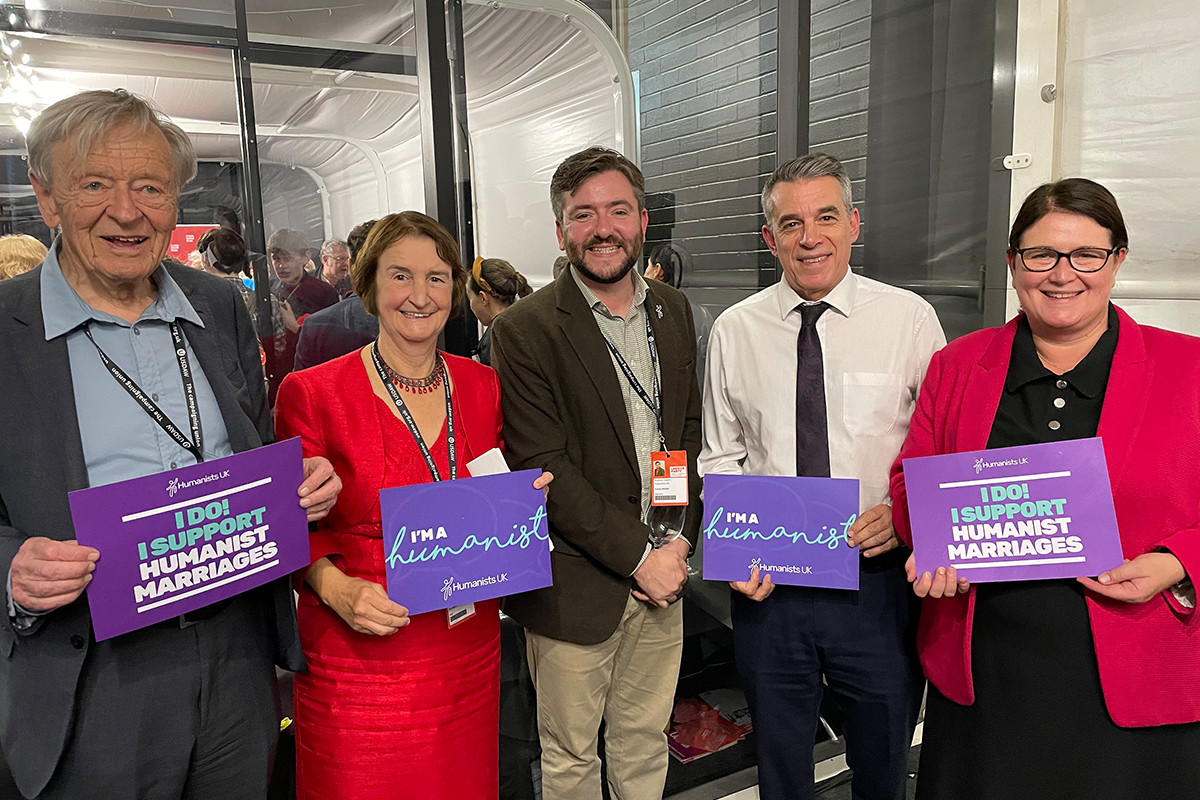
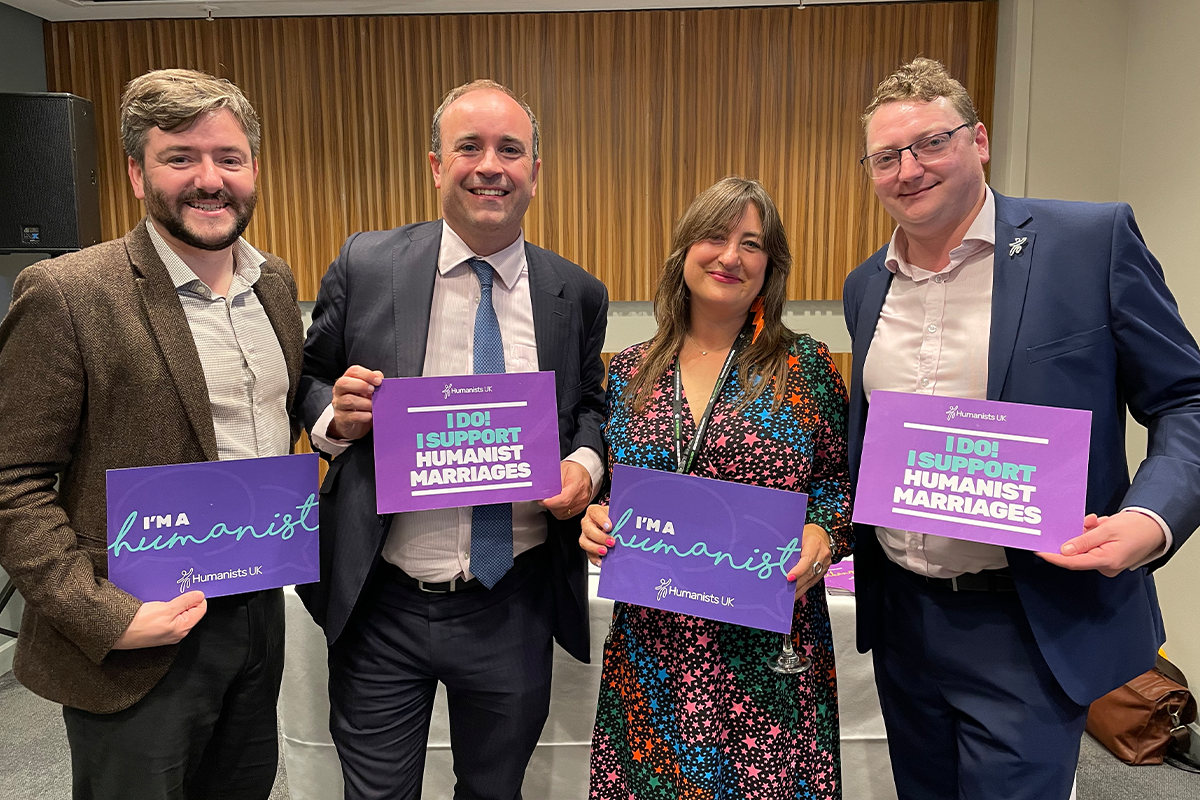
We enjoyed a successful party conference season in October. Staff attended the Conservative and Labour Party conferences, organising an informative and impactful fringe event at each, and were due to take part in similar events at the Liberal Democrats’ Conference prior to its cancellation. At our fringe at the Labour Party Conference in Liverpool, there were speeches from APPHG Treasurer Lord Alf Dubs, Vice Chairs Jeff Smith MP and Rachel Hopkins MP, and members Dame Nia Griffith MP and Dame Angela Eagle MP, chaired by Andrew Copson, our Chief Executive.
At the Conservative Party Conference in Birmingham, we co-hosted a ‘Humanist Wedding Reception’ with Conservative Humanists. Guests enjoyed cake and bubbly as they listened to speeches from Andrew Copson, humanist celebrant Zena Birch, APPHG Secretary Aaron Bell MP, and James Baird, Chair of Conservative Humanists.
14) Record-breaking year for media coverage
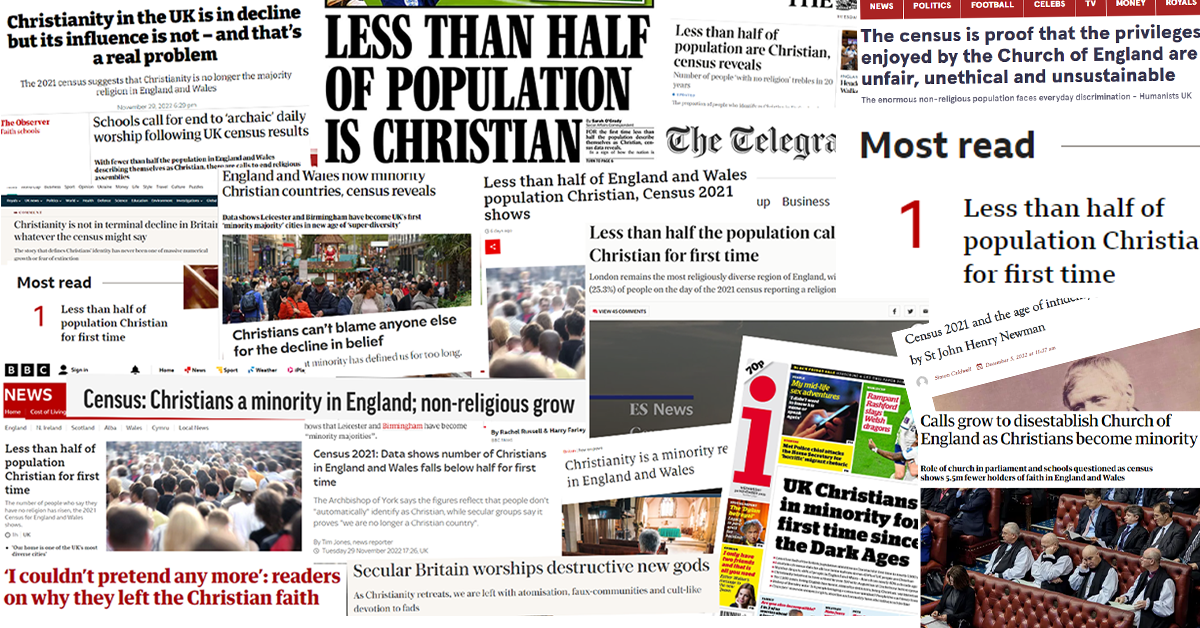
We have had a record-breaking year of media coverage across the board, having had wide-ranging mentions across print and online media, and high-profile broadcast appearances too. The biggest new story of our year was by far the release of the Census results. We appeared in well over 1,000 international, national, and regional news items and broadcasts in November. We were quoted by BBC News Online (both England and Wales), Sky News, the Guardian, Daily Mail, Telegraph, Times, Evening Standard, Mirror, i, Independent, Metro, Wales Online, The National, and across stories by the PA and Associated Press, while our Chief Executive Andrew Copson reached millions of viewers on ITV Evening News, Talk TV, and GB News. We also helped to frame the story through major international outlets such as the Washington Post.
By garnering this coverage, we have reached millions more people, marking real strides forwards in our campaigns (outlined above) for a more tolerant society where rational thinking and kindness prevail.
Notes:
For further comment or information, media should contact Humanists UK Director of Public Affairs and Policy Richy Thompson at press@humanists.uk or phone 020 7324 3072 or 020 3675 0959.
Humanists UK is the national charity working on behalf of non-religious people. Powered by 100,000 members and supporters, we advance free thinking and promote humanism to create a tolerant society where rational thinking and kindness prevail. We provide ceremonies, pastoral care, education, and support services benefitting over a million people every year and our campaigns advance humanist thinking on ethical issues, human rights, and equal treatment for all.
